After life in the street, the Endres family finds a home
Chris and Julienna have slept in a mobile home for 15 years, and their 13-year-old son Ayden has never lived in a house. That all changed in May, when the city of San Diego gave them state-subsidized housing
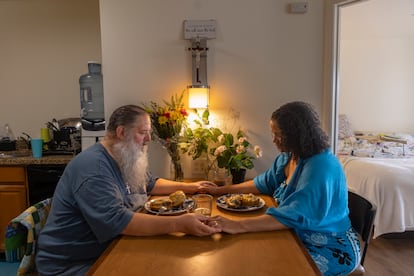

For the first four days, Ayden, the youngest member of the Endres family, having recently turned 13, couldn’t sleep by himself in his new room. He could only drift off in his parents’ bed. It’s his first time living in a house. Every other night of his life, Ayden has slept in a mobile home, on a sofa behind the driver’s seat. He and his family were always alert, aware of the threats of living in the street. The noises, the police who fined them and frequently threatened to have their vehicles towed, even a hard rain could disrupt their slumber.
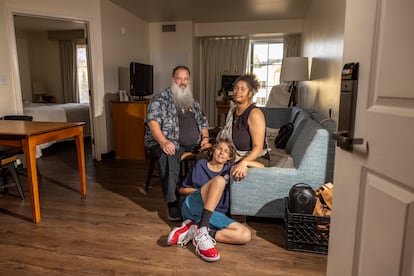
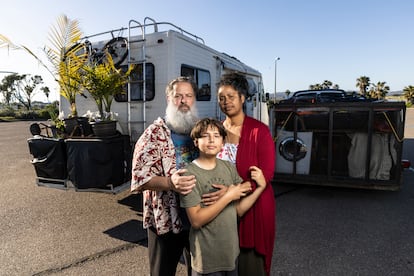
Ayden’s new home is an apartment that until recently, was a resort in the famous San Diego tourism zone. The 860-square-foot living space is simple, but it has everything his family needs to be comfortable: two bedrooms, two bathrooms and a small kitchen that connects to the living room. Through its windows, they can see the patio of the former tourist complex. At its center are a swimming pool and jacuzzi that have been dismantled and filled with sand. Few luxuries are left here, in what was previously a Marriott hotel.
Now, the entryway has security-enabled doors and the reception area is surrounded by bulletproof glass. Inside is a team of guards who ensure that the residents of the 190 homes who now make up the community respect each other. Veronica is one of the guards who watch over the complex. She interrupts her rounds to head out to her car for a bag that holds some gifts for the Endreses. “They are a lovely family, easy to live with. I’m glad they are with us,” she says. One of the bags contains an old video game console that Ayden is very excited about. He plugs it into the TV in the living room as soon as he gets back to the apartment.
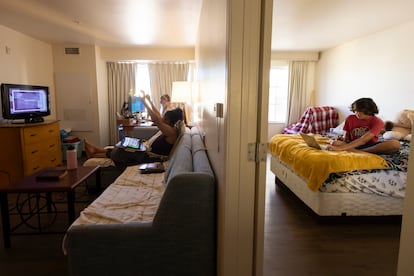
Fifty-six-year-old Chris and 53-year-old Julienna Endres say that 10 years have passed since they filled out the application to be on the waiting list to receive state-subsidized housing in San Diego. As a couple, they have been living on the streets for 15 years, but Chris has been houseless since he was 16, when his alcoholic father kicked him out of their home in Washington State. They got the good news in May. Everything sped up when René Gonzales, an employee at PATH — an organization that helps houseless people throughout 150 cities in California — took on the family’s case. After four months of phone calls and paperwork, one weekend in April, she sent them a text message saying, “I have good news for you guys, but it has to be person.”
Thirty days later, the Endres family found themselves living at last in housing. “I’m very happy for them,” says Gonzales. “But on the other hand, I have many other cases who have not had the same luck. Some of them are seniors, some of them more than 80 years old, and the city of San Diego hasn’t even offered them a roof to sleep under.” For July — the name her husband affectionately uses for Julienna — Chris and Ayden, this has been some of the best news of their lives. “When they told me that they were offering us this house, I never thought it would be so beautiful. It was renovated for us, with a new floor and appliances,” says a smiling Julienna.
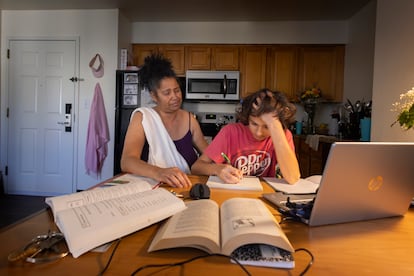
The Endres now must adapt to a new situation that has them living in a unique community. The former hotel is inhabited by people who were recently living in the streets, but also individuals from other socially disadvantaged groups, like those who were released from prison a short time ago. Although in general, their day-to-day lives are peaceful and they are satisfied with their new chapter, Chris still moves cautiously in this new environment. “The police and ambulances have come several times because of several incidents. And we’ve only been here for a little over a month.” The Endres are trying to get to know their neighbors better and become part of the community, attending activities that take place in the multi-use rooms of the hotel’s former restaurant. For Chris, they have an important reason to do so: life has left him wary, he worries over the dangers that Ayden could face. “I want to know who our neighbors are. So much time sleeping in the street has made it so I take precautions, and I need to know that I’m in a safe place.”
Today, in a room decorated with $30,000 worth of Nordic style furnishings donated by a well-known Swedish corporation, there is a cooking class taking place. In addition to new recipes, residents learn how to eat healthy on a budget. On other days, they play bingo or watch movies.
For years, the city of San Diego has been dealing with the challenges of a houseless population that continues to grow. Sometimes they come from other places, sometimes they are San Diego residents who have been forced to live in a tent due to the price of housing. “I’m aware that every month, many residents start the month with the fear of not being able to pay for their house, that they live with that feeling every week,” said the city’s mayor Todd Gloria two months ago at a groundbreaking ceremony for an affordable housing complex. In the same speech, he assured constituents that the homelessness problem is the top priority for his administration.
The City of San Diego is trying to address the issue with various tactics. On one hand, it is buying empty hotels like the one the Endres family now lives in, the 142-apartment Kearny Vista, and the historic Churchill Hotel, which has 72 living spaces. It is also building shelters, and setting up compounds in which houseless individuals have access to a tent, toilets, showers and food, as in the case of its Safe Sleeping Program.
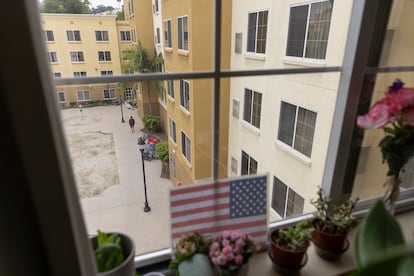
Although the city’s Housing Commission has given the family access to their new home, that doesn’t mean it will be free. They pay $400 a month in rent for an apartment that would normally cost $3,500. One of the problems that people in California face when it comes to accessing housing is its price, but also the credit history that banks and landlords require to sign a rental contract. The Endres have not had to present any collateral, and their internet, gas and water bills are included in their rent. The facility offers the family the peace of mind that comes from living in a house without fear of being evicted. Their income through state subsidies amounts to $1,390 a month, which is enough to pay for their subsidized housing. For months, the Endres will technically still be seen, in the eyes of social services, as a houseless family. For a year, they will have to demonstrate that they are capable of living in this home and in this community.
The old mobile home that served as their home for so many years, a ramshackle 1984 Southwind, is currently in a parking lot located close to the entrance of the building they live in. In it, Julienna studied for and graduated with a State of California paralegal degree. She did it for the job opportunity, but also to be able to litigate and appeal the more than $30,000 they had accumulated in fines. “It’s a great injustice, we had no alternatives, they wouldn’t let us park in any shelter because they said we had more than one vehicle. But we paid our taxes, the vehicle registration and we never committed any crime,” she says.
Now, July can spend time on one of her great passions: flowers. She has filled the windows of the apartment with small pots. Orchids, camellias and cacti border the view from her window. And she is trying to convince the neighbors to use the pool, which is now full of dirt, as a garden. “That way, the patio would be more beautiful,” she says.

Young Ayden no longer has to study on a board laid over the steering wheel. He has a desk in his bedroom, although he uses the kitchen table for the classes he continues to take with his mother. He still doesn’t go to school — his mom prefers to keep him in home school. His father Chris was able to repair the computer that hadn’t worked for months. Now, he has a table in the living room from which to continue with his business project and with his online English classes. Julienna has the option of getting a job at a law firm as a paralegal. She now has a home address to put on resumes, which will make the application process easier. This apartment, in addition to offering them a safe space, has given them the option to dream of a better life.
Sign up for our weekly newsletter to get more English-language news coverage from EL PAÍS USA Edition
Tu suscripción se está usando en otro dispositivo
¿Quieres añadir otro usuario a tu suscripción?
Si continúas leyendo en este dispositivo, no se podrá leer en el otro.
FlechaTu suscripción se está usando en otro dispositivo y solo puedes acceder a EL PAÍS desde un dispositivo a la vez.
Si quieres compartir tu cuenta, cambia tu suscripción a la modalidad Premium, así podrás añadir otro usuario. Cada uno accederá con su propia cuenta de email, lo que os permitirá personalizar vuestra experiencia en EL PAÍS.
¿Tienes una suscripción de empresa? Accede aquí para contratar más cuentas.
En el caso de no saber quién está usando tu cuenta, te recomendamos cambiar tu contraseña aquí.
Si decides continuar compartiendo tu cuenta, este mensaje se mostrará en tu dispositivo y en el de la otra persona que está usando tu cuenta de forma indefinida, afectando a tu experiencia de lectura. Puedes consultar aquí los términos y condiciones de la suscripción digital.








































